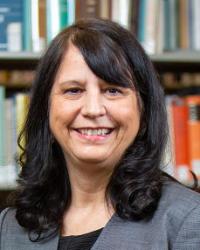NOTE: Dean Annette E. Clark '89 offered the following reflections and call to action in response to current events surrounding police brutality and racial injustice.
Other resources:
- Letter from BLSA 7.31.2020
- Dean's Letter 6.16.20
- Letter from faculty, June 16, 2020
- SJSJ Public Statement
- Change.org petition to law school administrators
- May letter from BLSA

In times of crisis, it is my job as dean to speak and to lead our community of students, faculty, staff, and alumni, but I have struggled for words — any words — to say to you in the wake of the senseless murders of George Floyd, Ahmaud Arbery, and Breonna Taylor at the hands of law enforcement.
As I've tried to follow the words of Natasha Martin, Seattle University's Vice President for Diversity and Inclusion and a Professor of Law, to "be present to every breath [I] take today and the days to come — [to] remember Floyd, Arbery, Taylor, and the countless others whose lives have been snuffed out by racism and bigotry," I've experienced a kaleidoscope of searing and haunting images. Images of death and pain, rage and sorrow, protest and frustration. These heinous acts against our Black brothers and sisters stand as a stark indictment of this nation and of each of us who has benefited through white privilege from this deeply rooted system of racial and social injustice and inequality. Noted lawyer and social justice activist Bryan Stevenson teaches us that the reckoning must come before reconciliation. If this is the reckoning, so be it.
Over and over again, I keep coming back to the words of Langston Hughes, our American poet, and his poem "Let America Be America Again." Because I agree that to stay silent is to be complicit, and because I've struggled to find my own words, I humbly offer those of Hughes and his clarion call to this country:
Let America be America again.
Let it be the dream it used to be.
Let it be the pioneer on the plain
Seeking a home where he himself is free.
(America never was America to me.)
Let America be the dream the dreamers dreamed-
Let it be that great strong land of love
Where never kings connive nor tyrants scheme
That any man be crushed by one above.
(It never was America to me.)
Read the full poem
As Langston Hughes said, "we, the people, must redeem." And as a community of lawyers, we have a particular responsibility to do this work of naming and rooting out the racism that operates at the core of, and is perpetuated by, our legal system. As called for by yesterday's statement from our Black Law Student Association students, I pledge that our law school community will endeavor to move beyond the simple, and actively "read, understand, DO." Here are three of our action items:
1) It is vital that we continue to build our understanding of the pervasive effects of racism in all its forms. This Change.org petition, put forth by some of our students, contains many helpful suggestions. At the law school, I will engage my colleagues in the Access to Justice Institute, the Social Justice Leadership Committee, and the SBA leadership to begin planning additional racial justice education for this coming year.
2) This Thursday, June 4, from 1 to 2 p.m., we invite you to attend an online George Floyd Teach-in that we will live-stream on Seattle U Law's YouTube channel. Professors Bryan Adamson and Deborah Ahrens will discuss the factual and legal aspects of George Floyd's death at the hands of Minneapolis police and the resulting demonstrations.
3) Several months ago, we purchased 40 tickets to a Seattle Arts & Lectures event with Carol Anderson, the author of White Rage and One Person, No Vote. Our plan was to distribute the tickets to members of our community who participated in this spring's Racial Justice Book Groups. The event was rescheduled from April to the evening of Sunday, June 21, at 7:30 p.m. and will now be offered virtually. Because we previously purchased tickets, we'll receive a link to the program that we've been approved to distribute to our students. I hope you will purchase a digital pass to join us for this timely and important lecture.
We are a law school dedicated to a lifetime in the law at the service of justice, and we have work to do together. I encourage you, our alumni, to develop your own action items and let us know how we can collaborate with you. And to my Black colleagues, I offer this: I see you, I hear you, and I am deeply sorry.
